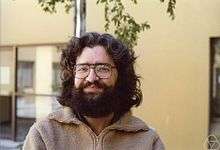Allen Hatcher
| Allen E. Hatcher | |
|---|---|
|
Allen Hatcher | |
| Born | October 23, 1944 |
| Nationality | American |
| Fields | Mathematics |
| Institutions | Cornell University |
| Alma mater | Stanford University |
| Doctoral advisor | Hans Samelson |
Allen Edward Hatcher (born October 23, 1944) is an American topologist.
Biography
Hatcher received his Ph.D. under the supervision of Hans Samelson at Stanford University in 1971. He went on to become a professor in UCLA. Since 1983 he has been a professor at Cornell University.
Mathematical contributions
He has worked in geometric topology, both in high dimensions, relating pseudoisotopy to algebraic K-theory, and in low dimensions: surfaces and 3-manifolds, such as proving the Smale conjecture for the 3-sphere.
3-manifolds
Perhaps among his most recognized results in 3-manifolds concern the classification of incompressible surfaces in certain 3-manifolds and their boundary slopes. Bill Floyd and Hatcher classified all the incompressible surfaces in punctured-torus bundles over the circle. Bill Thurston and Hatcher classified the incompressible surfaces in 2-bridge knot complements. As corollaries, this gave more examples of non-Haken, non-Seifert fibered, irreducible 3-manifolds and extended the techniques and line of investigation started in Thurston's Princeton lecture notes. Hatcher also showed that irreducible, boundary-irreducible 3-manifolds with toral boundary have at most "half" of all possible boundary slopes resulting from essential surfaces. In the case of one torus boundary, one can conclude that the number of slopes given by essential surfaces is finite.
Hatcher has made contributions to the so-called theory of essential laminations in 3-manifolds. He invented the notion of "end-incompressibility" and several of his students, such as Mark Brittenham, Charles Delman, and Rachel Roberts, have made important contributions to the theory.
Surfaces
Hatcher and Thurston exhibited an algorithm to produce a presentation of the mapping class group of a closed, orientable surface. Their work relied on the notion of a cut system and moves that relate any two systems.
Selected publications
Papers
- Hatcher and Thurston, A presentation for the mapping class group of a closed orientable surface. Topology 19 (1980), no. 3, 221—237.
- Hatcher, On the boundary curves of incompressible surfaces. Pacific J. Math. 99 (1982), no. 2, 373—377.
- Floyd and Hatcher, Incompressible surfaces in punctured-torus bundles. Topology Appl. 13 (1982), no. 3, 263—282.
- Hatcher and Thurston, Incompressible surfaces in -bridge knot complements. Invent. Math. 79 (1985), no. 2, 225—246.
- Hatcher, A proof of the Smale conjecture, . Ann. of Math. (2) 117 (1983), no. 3, 553—607.
Books
- Hatcher, Allen, Algebraic topology. Cambridge University Press, Cambridge, 2002. xii+544 pp. ISBN 0-521-79160-X and ISBN 0-521-79540-0
Books in progress
External links
- Hatcher's official page
- Hatcher's personal homepage
- Allen Hatcher at the Mathematics Genealogy Project
